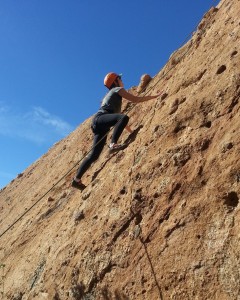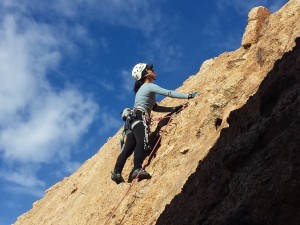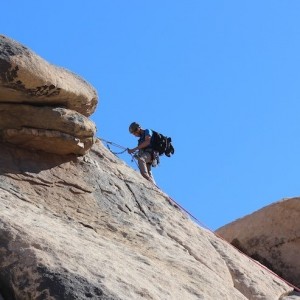This is a great question we hear frequently from students: What gear will I need for rock climbing?
Most try rock climbing and once they like the sport enough to invest in it, they start shopping for gear around town or online. Like I mentioned on a previous post, “Spending a little, saves you a lot…”, it is in the best practices to purchase your own equipment.
Beginner Rock Climbers
 The first few items a beginner rock climber often buys are a rock climbing shoes, a harness, a belay device and a locking carabiner. For some reason, beginners stop here, because they do not feel confident enough to have sufficient information regarding what rope length, rope diameter, or even rope brand to get. Most beginner rock climbers go indoors to practice their technique. While they develop their skill, they find time to do research or ask around others who own ropes (if you haven’t started this process, you should start now). Others go outside with friends that already have equipment to test the different ropes and make a more educated decision based on feel, look, or others’ opinions of ropes. As a beginner, it is your responsibility to find that rope that works best for your needs.
The first few items a beginner rock climber often buys are a rock climbing shoes, a harness, a belay device and a locking carabiner. For some reason, beginners stop here, because they do not feel confident enough to have sufficient information regarding what rope length, rope diameter, or even rope brand to get. Most beginner rock climbers go indoors to practice their technique. While they develop their skill, they find time to do research or ask around others who own ropes (if you haven’t started this process, you should start now). Others go outside with friends that already have equipment to test the different ropes and make a more educated decision based on feel, look, or others’ opinions of ropes. As a beginner, it is your responsibility to find that rope that works best for your needs.
Intermediate Rock Climbers
 Intermediate rock climbers are those who move on building natural anchors, pro anchors, and fixed anchors. Also know sport lead, trad lead, and lead belay. At this point, we hear the same question once again: What gear will I need to rock climb? Move on to reviewing and purchasing anchoring gear such as; locking carabiners, slings, cordelettes, webbing, static rope, cords, etc. All you will need, will depend on the specific areas you want to climb. Then move on to purchasing sport lead gear such as 10-15 quick draws (depending on the routes you are going to climb). For Trad Lead the bills start rolling out of control with things such as; cams, tri-cams, more slings, a sling to carry all your Trad gear, a good pack, etc.
Intermediate rock climbers are those who move on building natural anchors, pro anchors, and fixed anchors. Also know sport lead, trad lead, and lead belay. At this point, we hear the same question once again: What gear will I need to rock climb? Move on to reviewing and purchasing anchoring gear such as; locking carabiners, slings, cordelettes, webbing, static rope, cords, etc. All you will need, will depend on the specific areas you want to climb. Then move on to purchasing sport lead gear such as 10-15 quick draws (depending on the routes you are going to climb). For Trad Lead the bills start rolling out of control with things such as; cams, tri-cams, more slings, a sling to carry all your Trad gear, a good pack, etc.
Advanced Rock Climbers
 Advanced Rock Climbers train hard to keep themselves fit enough and study to be educated on the overall sport of rock climbing. Pulling a hard or difficult climb does not put you in this category. Advanced rock climbers spend good amount of time educating themselves on more than just how to move your feet or pull a crimpy 5.12b. Becoming an advance rock climber requires patience and dedication, reading and hands on training of wilderness awareness and first aid, self-rescue and rescue techniques. In this category, just like at the intermediate level, advanced rock climbers spend time and money on training, certifications, and even more equipment such as; first aid kits, extra ropes, and anything else you can possibly need during an emergency.
Advanced Rock Climbers train hard to keep themselves fit enough and study to be educated on the overall sport of rock climbing. Pulling a hard or difficult climb does not put you in this category. Advanced rock climbers spend good amount of time educating themselves on more than just how to move your feet or pull a crimpy 5.12b. Becoming an advance rock climber requires patience and dedication, reading and hands on training of wilderness awareness and first aid, self-rescue and rescue techniques. In this category, just like at the intermediate level, advanced rock climbers spend time and money on training, certifications, and even more equipment such as; first aid kits, extra ropes, and anything else you can possibly need during an emergency.
No matter what level of climber you are, the information on what equipment you need, is always going to be available to you – all you have to do is ask or search online. This all goes hand in hand with another previous blog post’ “Rock Climbing…Educate yourself”. Don’t be afraid to ask questions.
Stay safe.
